If your aspiration is to rule the world where seas will rise when you give the word, playing Sid Meier’s Civilization games is probably the best way to fulfil that wish. For epic exploration, expansion, exploitation and extermination (4X) through the ages, few strategy titles can match the ambitious scope and grandeur of Civilization games.
It has been nine years since the last Civilization game, Civilization VI, was released. The latest Civilization VII carries on the tradition as a 4X turn-based strategy game on a hexagonal tiled map where you can play as historic leaders and civilisations, but with some new twists.
Winning ways
Civilization VII lets you choose from over 20 different historical leaders, three discrete Ages and 10-11 civilisations from each Age, offering plenty of options to customise your gameplay.
You can mix and match your leaders with different civilisations — think Charlemagne as the leader of the Greeks, or Confucious leading the Egyptians, and you can also pick any of the three Ages to start your game in.
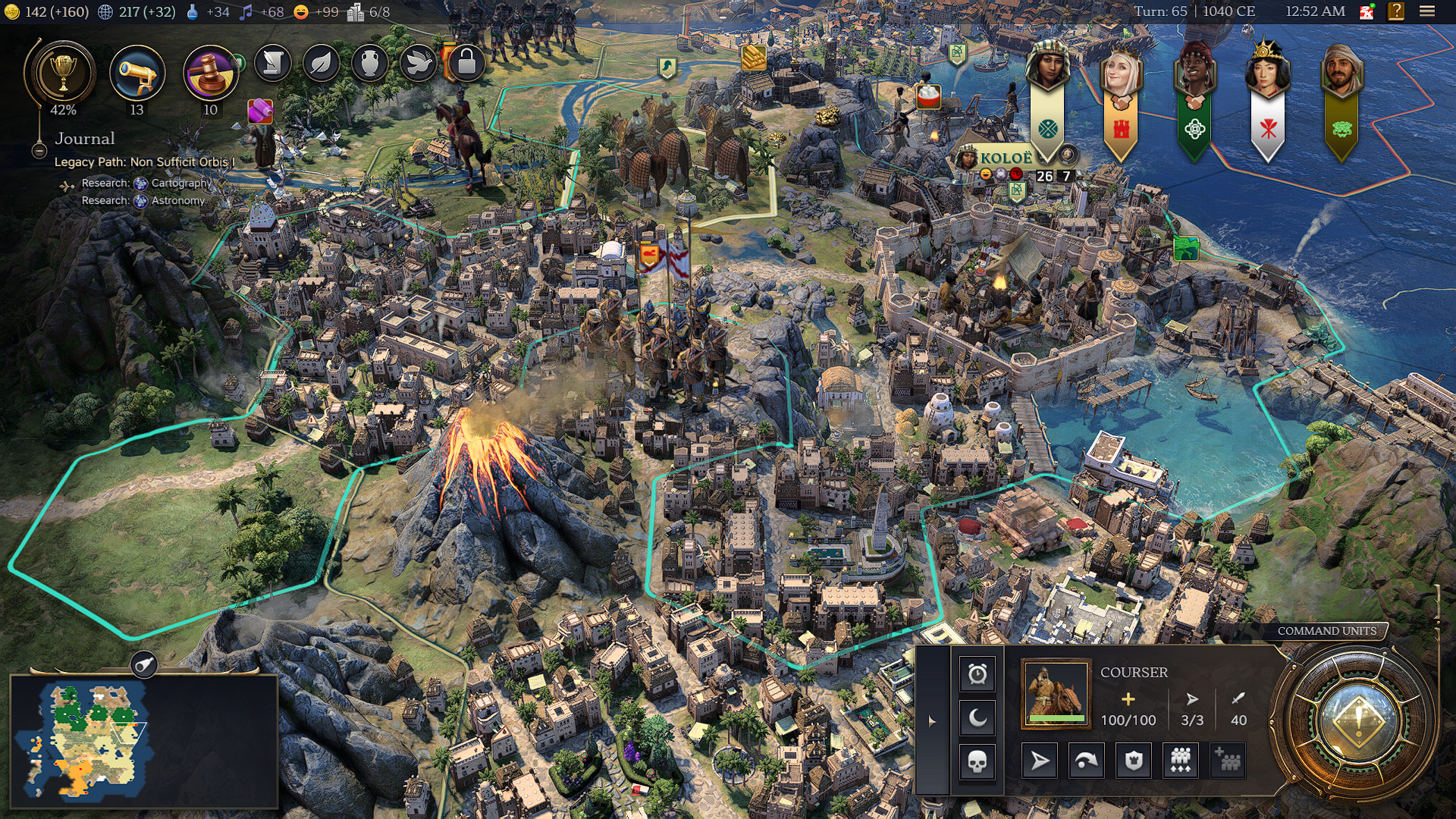
Once you have your home city established, you can decide how your civilisation progresses. By growing your city, setting up new towns, occupying certain tiles and developing buildings, you can earn points in production, food, culture, technology, happiness and influence, which lets you advance in different paths.
You also need to pick which civics and technology to research in so your civilisation gets an advantage over your opponents on the map.
Like previous Civ games, there are several different paths to victory. These include the traditional Legacy paths of Science, Economic, Culture and Military victories.
There are also victories by Domination, where all rivals on the map and their civilisations are defeated, and Points, where the number of points earned in the Legacy paths are totalled up at the end of the final Modern Age and the player with the highest points wins.
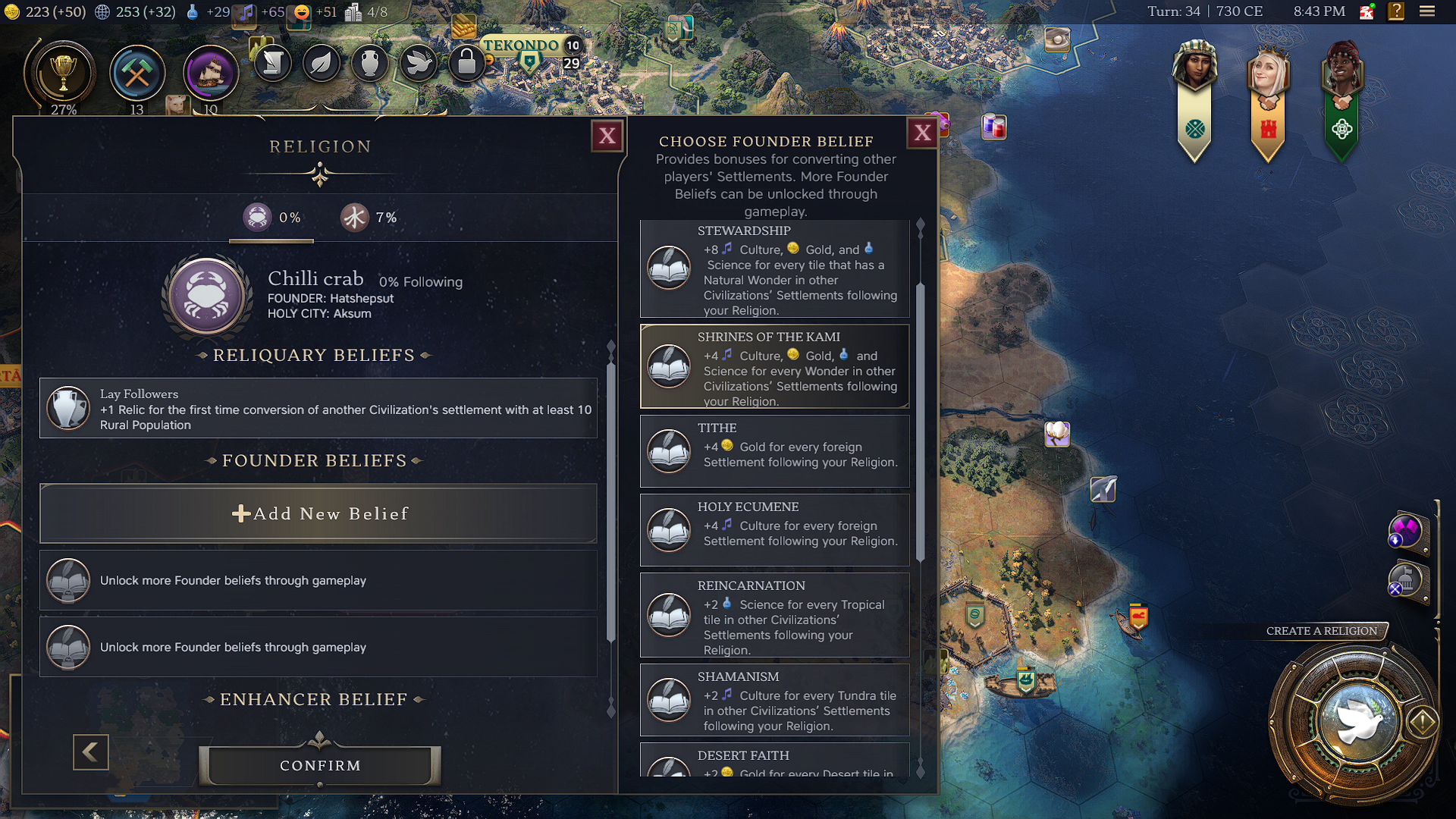
Sadly, Civ VII has done away with the Religious victory featured in Civ VI, which was my favourite way to play. Just like I did in Civ VI, I set up a wildly popular Chilli Crab religion with missionaries in foreign fields, but religion is only available in the Exploration Age. Although one can start spreading religion and exert influence over the opponent’s territories, it is not one of the main criteria for final victory.
Depending on which paths you pursue, you’ll need to hit key objectives for your civilisation, such as building one of a kind Wonders before others do, grabbing relics scattered across the continents or winning the technology race by being the first to launch a staffed space flight.
Although not a criteria for winning, diplomacy plays a huge role in your civilisation’s survival. One needs to be constantly gaining influence and making fragile alliances with frenemies while banding together to wage wars against hostile rulers or defending your territory.
War is inevitable, which means investing in military technology and upgraded troops is a must even if you plan to play as a peaceful civilisation.
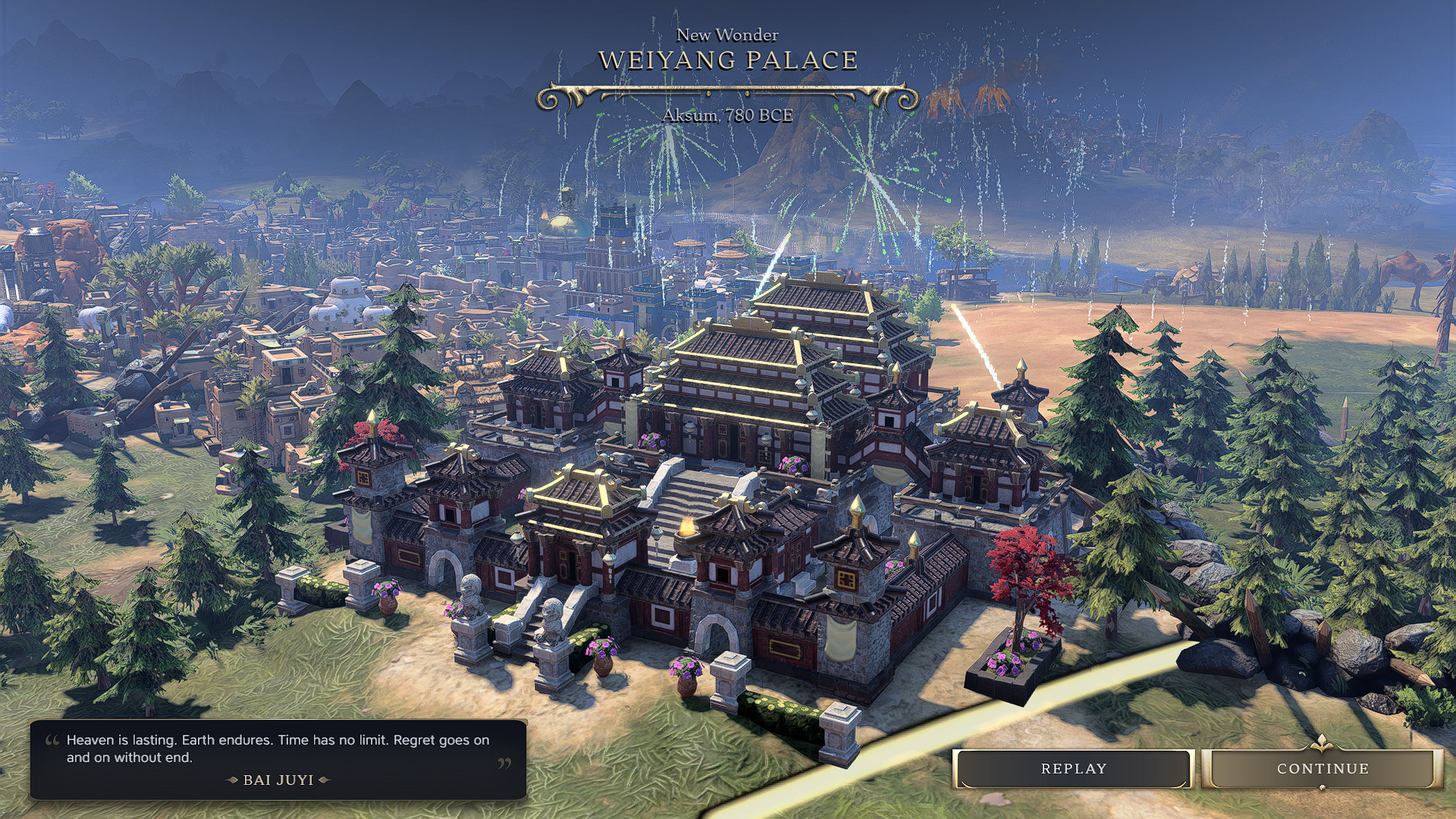
Changes in the Ages
Civ VII features three discrete Ages, namely Antiquity, Exploration and Modern. One major change is how the Ages do a “soft reset” on the progress of your civilisation during the transition. It takes a few turns in the new Age for the dust to settle before you can focus on your civilisation’s growth and the next steps.
For one, you can pick a new civilisation based on the progression of the one prior at the start of a new Age. This frees you from being tied down by the same civilisation that you start with, which is liberating.
However, for leaders who are fondly attached to the civilisation that they have lovingly and painstakingly nurtured, it feels rather jarring to be suddenly ruling a new bunch of people and see completely different architecture.
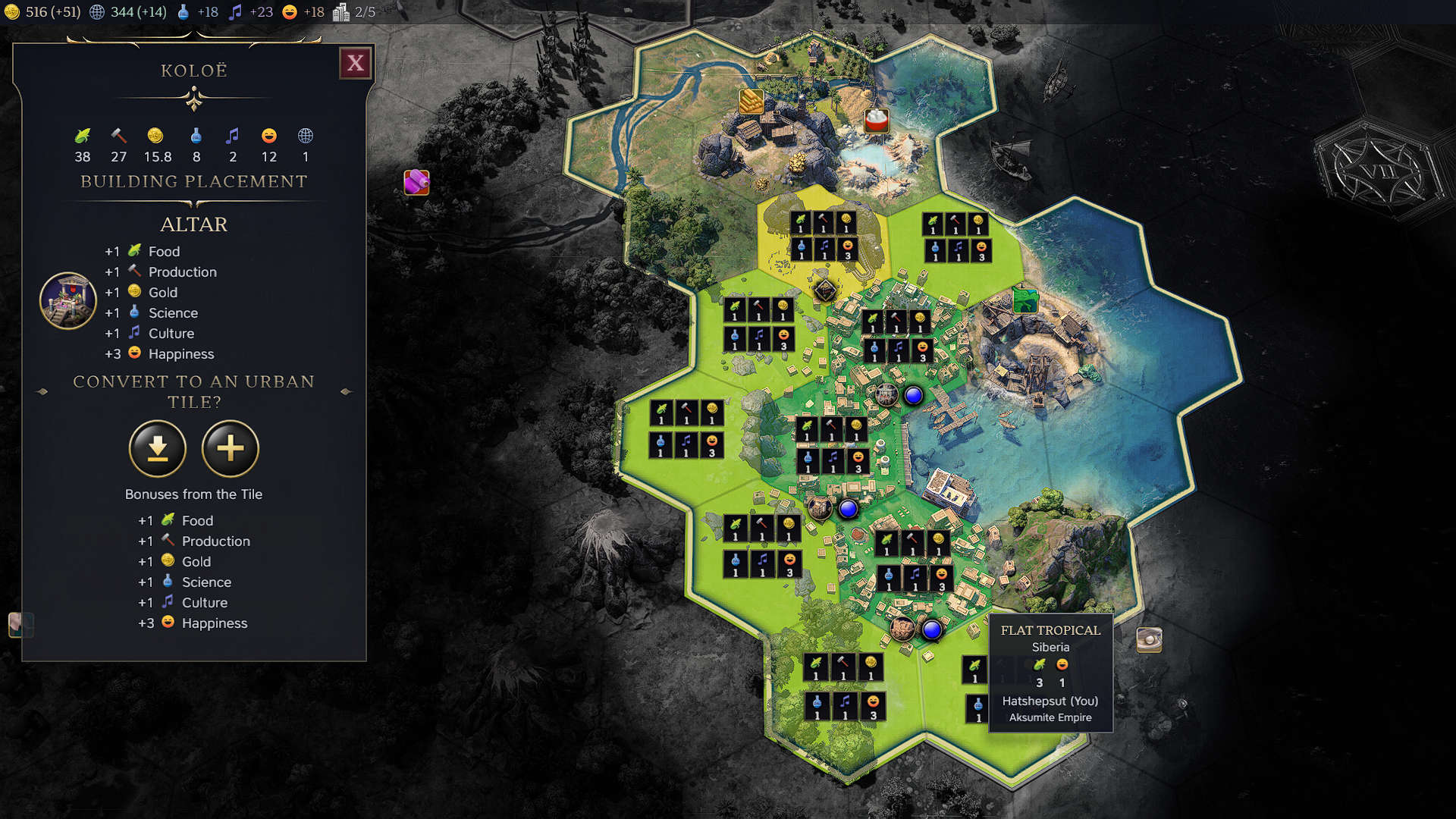
You get to keep your leader, certain ageless buildings that are immune to the change in Age, commanders of your troops or fleets, and traditions. Everything else is subjected to a reset.
Sadly, alliances which were forged in one Age are almost forgotten in the next. Also, to bring troops across the Age transition, there must be sufficient commanders for the troops to group under or else they will just vanish.
Age transitions add urgency to actions that may take many turns to complete. For instance, befriending independent tribes in the hope to incorporate them into your civilisation has to be completed before the Age transition, otherwise they will simply disappear and all your efforts will be wasted.
Getting the tribe to join your civilisation takes around 70 turns unless you unlock some perks or have Influence to spare to speed things up.
Another change that creates some urgency in your actions are major crises that are shown on the timeline at every Age. This is similar to Frostpunk 2, a recent turn-based strategy game, where you can prepare for crises in advance.
For my first playthrough, I started with the Aksum civilisation, then Songhai and finally the Qing, and ended up with a melting pot of towns, cities and units named based on which civilisation they were created. For instance, by the Modern Age, I have Aksum as my capital, Timbuktu as one of my towns and Suzhou as one of my cities, which gave me a bit of an identity crisis.
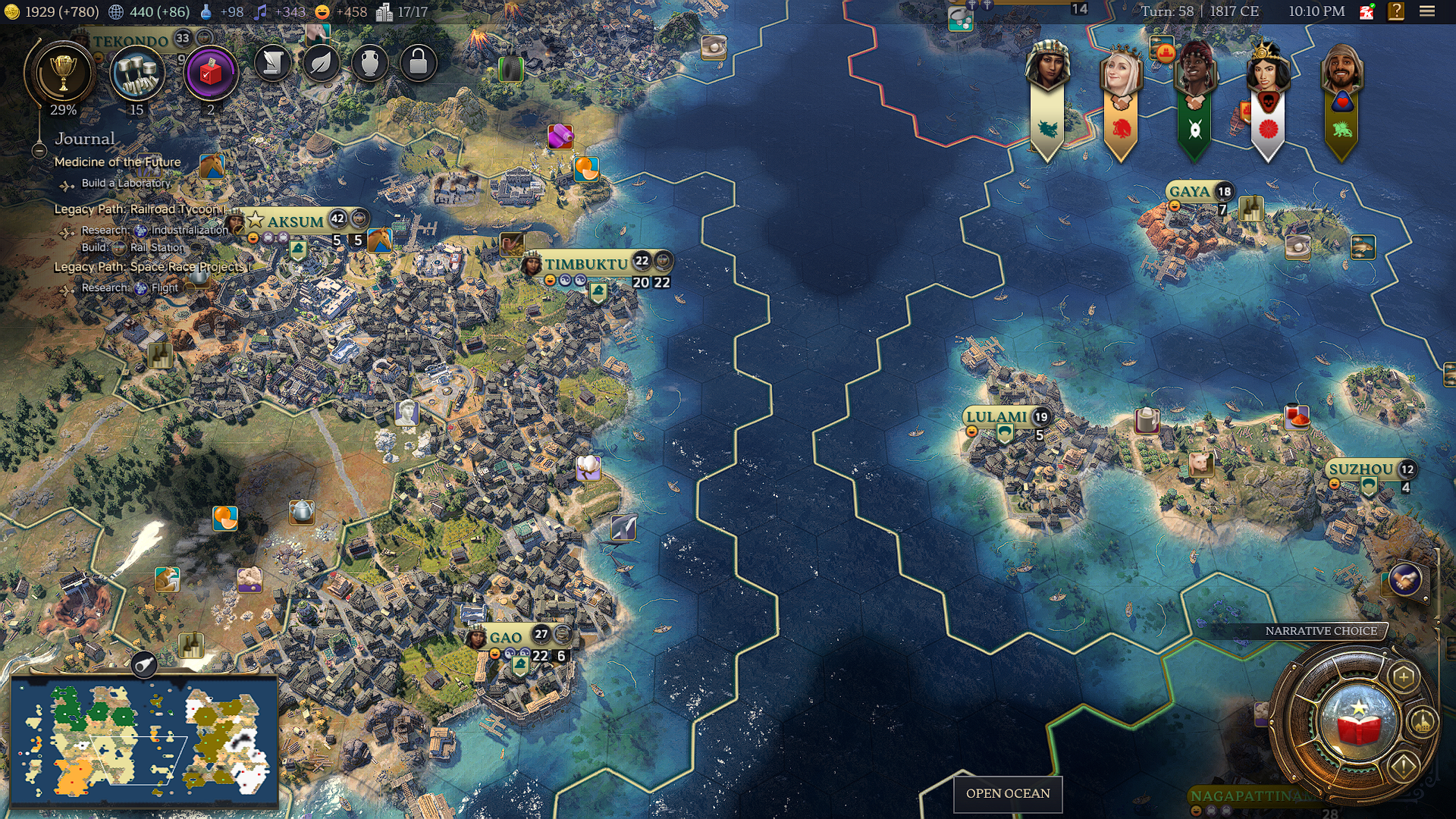
Although the Age transitions are pretty disruptive and jarring, there are some upsides. The Age transitions gives you a chance to restart on your civilisation’s relationships and forces you to let go of enmity and ancient grudges, as well as past cliques and friendships. It is definitely not an easy change to make, but it also forces you as a player not to be complacent.
One more turn
With Civ VII’s addictive “one more turn” gameplay, it is easy to get sucked in. Hours will fly by when you are planning a bold conquest, juggling alliances, staving off and inevitably fighting wars, aggressively growing and developing towns and cities, grabbing resources, racing to advance in technology or completing a Wonder before your opponents.
If you are a micromanaging worry wart like me, each turn can take a long time as you ponder every action, manage every unit and study every tile on the map. As the game progresses, every turn takes even longer as there is so much to do once you have many settlements, a sizable military and loads of projects queued up. But nothing beats the thrill of beating your opponents in a technological or cultural race or destroying your foes on the battlefield.

I faced some issues with the unintiutive and unnecessarily cumbersome user interface. Although Civ VII has a very comprehensive in-game wiki, it is pretty intimidating to be hit by a wall of text while trying to find out how to perform a critical action in the game to meet your objectives.
For instance, it took me many clicks before I figured out how to allocate resources, and also that only certain resources can be allocated to towns or cities, or cannot be allocated at all.
Another issue is the inability to locate your troops scattered across the map especially if you had “snoozed” them — I wish there is a way to highlight or scroll through a list of, say, all your missionaries or explorers on the map who are in foreign fields.
Civ VII’s graphics and animations are magnificent, and are a step above the cartoony look of Civ VI. The graphics are outstanding even under close scrutiny — you can zoom in to admire the distinctive architecture of your grand civilisation, watch the detailed animations and even hear the sounds matching the activities on the tiles.
It’s so enjoyable to see schools of fish swimming in the sea and people working in the mines, while hearing animals yelp in the farms. The soundtrack also matches the civilisation that you are managing, with culturally-appropriate music that makes for an engaging atmosphere.
Civ VII can be played either with AI opponents over a long drawn-out epic across the Ages for tens of hours, or much shorter sessions with real-world players via the online multiplayer mode.
TL;DR
Despite the disruption and messiness brought about the “soft resets” of the Age transitions, as well as initial issues with the learning curve and quirky user interface, Civ VII still has the incredibly addictive “one more turn” element to it, as well as improved graphics and audio over previous installments.
The new twists bring some freshness and challenges to the long running franchise, and even seasoned Civilization veterans will have to learn some new tricks to succeed.
Comparing my experience with Civ VI, I do miss the continuity of staying with the same civilisations and alliances throughout the Ages, and also not being able to use religion throughout to placidly yet insidiously influence others.
If you love playing grand strategy 4X games, the thrill of nurturing and conquest, and don’t mind putting in a bit of effort to study the wiki and navigate the quirky interface, Civilization VII is a gorgeous game that will consume your attention and time.
Civilization VII is available for the PC on Steam and Epic Games, PlayStation 4 and 5 and Xbox Series X|S for S$99.






